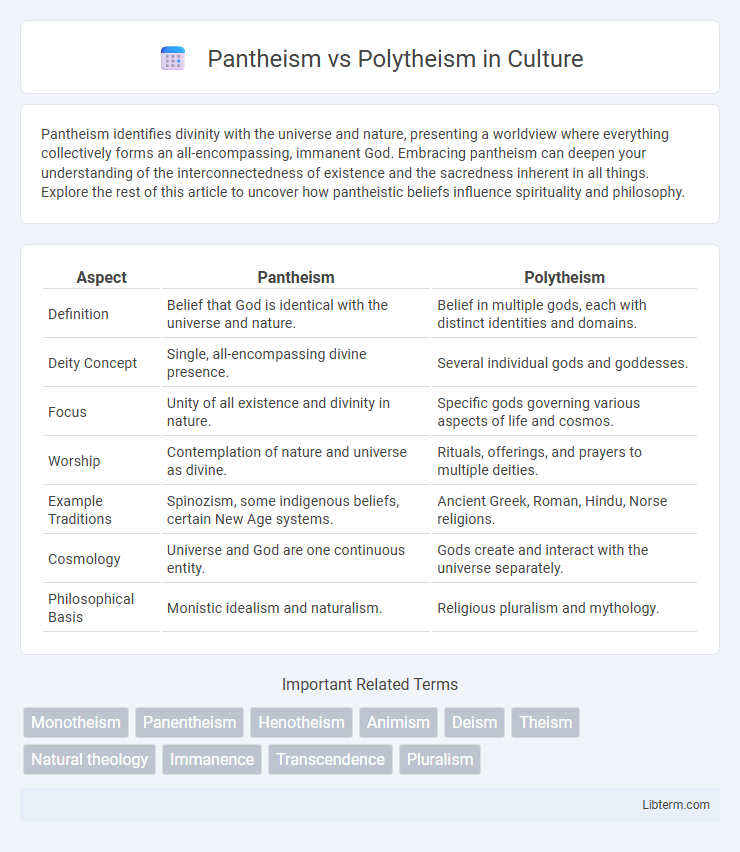Pantheism identifies divinity with the universe and nature, presenting a worldview where everything collectively forms an all-encompassing, immanent God. Embracing pantheism can deepen your understanding of the interconnectedness of existence and the sacredness inherent in all things. Explore the rest of this article to uncover how pantheistic beliefs influence spirituality and philosophy.
Table of Comparison
| Aspect | Pantheism | Polytheism |
|---|---|---|
| Definition | Belief that God is identical with the universe and nature. | Belief in multiple gods, each with distinct identities and domains. |
| Deity Concept | Single, all-encompassing divine presence. | Several individual gods and goddesses. |
| Focus | Unity of all existence and divinity in nature. | Specific gods governing various aspects of life and cosmos. |
| Worship | Contemplation of nature and universe as divine. | Rituals, offerings, and prayers to multiple deities. |
| Example Traditions | Spinozism, some indigenous beliefs, certain New Age systems. | Ancient Greek, Roman, Hindu, Norse religions. |
| Cosmology | Universe and God are one continuous entity. | Gods create and interact with the universe separately. |
| Philosophical Basis | Monistic idealism and naturalism. | Religious pluralism and mythology. |
Introduction to Pantheism and Polytheism
Pantheism identifies divinity with the universe and nature, asserting that God is immanent in all things rather than a distinct, personal entity. Polytheism, in contrast, recognizes multiple gods, each with specific attributes, roles, and personalities, often representing natural forces or human experiences. These belief systems shape diverse religious practices and philosophical views on the divine's nature and presence in the world.
Defining Pantheism: Belief and Principles
Pantheism defines God as synonymous with the universe, embodying an all-encompassing, immanent divine presence rather than distinct deities. It emphasizes the unity and interconnectedness of all existence, rejecting the idea of separate gods or supernatural beings. This worldview contrasts with polytheism, which worships multiple gods with individual identities and domains within a pantheon.
Understanding Polytheism: Core Concepts
Polytheism centers on the belief in multiple gods, each with distinct personalities, powers, and domains like war, love, or agriculture, reflecting diverse aspects of life and nature. These deities often interact with humans through myths, rituals, and offerings, shaping cultural traditions and religious practices. Understanding polytheism involves recognizing its decentralized divine hierarchy and the symbolic relationships between gods that explain natural phenomena and human experiences.
Historical Origins of Pantheism
Pantheism traces its origins to ancient philosophical traditions in India and Greece, notably in the Upanishads and Stoicism, where the divine is seen as identical with the universe itself. Early Pantheistic ideas emphasize the unity of all existence and divine presence in nature, contrasting with Polytheism's worship of multiple distinct gods with individual personalities. This foundational difference influenced religious and philosophical developments, shaping the conceptual framework of spirituality as a singular, all-encompassing reality rather than a pantheon of separate deities.
Historical Roots of Polytheism
Polytheism, one of the earliest forms of religious belief, originated in ancient civilizations such as Mesopotamia, Egypt, and Greece, where multiple gods represented natural forces and human experiences. These deities often had distinct personalities and domains, reflecting societal values and the environment. In contrast, pantheism sees divinity as an all-encompassing, singular essence present in the universe, rather than separate gods.
Major Differences: Pantheism vs Polytheism
Pantheism posits that divinity is identical with the universe, meaning God and the cosmos are one and the same, emphasizing an all-encompassing, singular God essence. Polytheism, in contrast, involves belief in multiple gods, each with distinct personalities, powers, and roles governing different aspects of nature or human experience. The key difference lies in pantheism's unity of God and universe versus polytheism's multiplicity of independent deities.
Similarities and Intersections
Pantheism and polytheism both explore the divine's presence in the universe, emphasizing spirituality beyond monotheistic frameworks. Pantheism equates God with the universe itself, suggesting an all-encompassing divine essence, while polytheism involves belief in multiple distinct gods representing various aspects of nature and human experience. Both systems reflect a diversity of divine manifestations, often intersecting in their reverence for nature and the sacredness imbued in different elements of existence.
Influence on Modern Spirituality and Religion
Pantheism's influence on modern spirituality is evident in movements emphasizing the interconnectedness of all life and the divine presence within the universe, fostering ecological awareness and holistic practices. Polytheism's impact persists through the revival of ancient mythologies and the worship of multiple deities in contemporary neopagan and Wiccan traditions, highlighting diversity in divine representations. Both belief systems contribute to the growing plurality in spiritual expression, challenging monotheistic dominance and enriching religious dialogue globally.
Famous Examples and Practitioners
Pantheism is exemplified by Baruch Spinoza, whose philosophy identified God with the universe, influencing modern environmental and spiritual thought. Polytheism is prominently practiced in Hinduism, with deities like Vishnu, Shiva, and Durga worshipped in diverse rituals and traditions across millions of followers. Ancient Greek polytheism involving gods such as Zeus, Hera, and Athena also serves as a key cultural and religious reference point in historical studies.
Conclusion: Contemporary Relevance and Debate
Pantheism and polytheism offer distinct perspectives on divinity that continue to shape contemporary spiritual discourse and environmental ethics. Pantheism's emphasis on the universe as a singular divine entity informs modern ecological movements and holistic worldviews, while polytheism's recognition of multiple deities allows for diverse cultural expressions and pluralistic religious practices. Ongoing debate centers on how each framework addresses the complexity of existence and the role of spirituality in a rapidly globalizing world.
Pantheism Infographic

 libterm.com
libterm.com